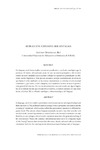Identificador persistente para citar o vincular este elemento:
https://accedacris.ulpgc.es/jspui/handle/10553/6416
| Campo DC | Valor | idioma |
|---|---|---|
| dc.contributor.author | Domínguez Rey, Antonio | en_US |
| dc.date.accessioned | 2011-09-29T02:31:00Z | - |
| dc.date.accessioned | 2018-03-08T09:03:06Z | - |
| dc.date.available | 2011-09-29T04:00:29Z | - |
| dc.date.available | 2018-03-08T09:03:06Z | - |
| dc.date.issued | 2006 | en_US |
| dc.identifier.issn | 1136-3169 | en_US |
| dc.identifier.uri | https://accedacris.ulpgc.es/handle/10553/6416 | - |
| dc.description.abstract | En lenguaje, toda forma implica un entorno predicativo y un fondo ontológico que la potencia. El núcleo del predicado parte de una asociación perceptiva y del recubrimiento de actos mentales cuyas acciones reflejan los operadores gramaticales en diferentes niveles lingüísticos. Este proceso acontece siempre nominalmente, de tal modo que hasta el verbo implicado en las mutuas dependencias se retrotrae al acto nominal constitutivo y, por tanto, a todo sintagma, cuya expansión locutiva anuncia la predicación general del entorno. Por eso la subordinación oracional resulta una figura lingüística de la tensión dicente que circunscribe al nombre, ya dotado entonces de una orientación ad-verbum. Tal es el fondo ontológico y fenomenológico del lenguaje. | en_US |
| dc.description.abstract | In language, any form implies a predicative environment and an ontological background that empowers it. The predicate’s nucleus emerges from a perceptive association and the covering of mental acts which actions reflect the grammatical operators in different linguistic levels. This process always happens nominally, in such a way that even the verb involved in the mutual dependences is carried back to the nominal constitutive act and, therefore, to any syntagm, whose locutive expansion announces the general preaching of the environment. Thence the sentence subordination turns out to be a linguistic figure of the “saying” tension that circumscribes the name, already endowed with an ad-verbum orientation. Such it is the ontological and phenomenological background of language. | en_US |
| dc.format | application/pdf | es |
| dc.language | spa | en_US |
| dc.relation.ispartof | Philologica canariensia | en_US |
| dc.source | Philologica Canariensia. Las Palmas de Gran Canaria: Facultad de Filología de la Universidad de Las Palmas de Gran Canaria, 1994-.-- ISSN 1136-3169.-- n. 12-13 (2006-2007), p. 237 | en_US |
| dc.subject | 550510 Filología | en_US |
| dc.subject | 570107 Lengua y literatura | en_US |
| dc.title | Retracción expansiva del sintagma | en_US |
| dc.type | info:eu-repo/semantics/article | en_US |
| dc.type | Article | en_US |
| dc.compliance.driver | 1 | es |
| dc.identifier.absysnet | 234349 | - |
| dc.identifier.crisid | - | - |
| dc.investigacion | Artes y Humanidades | en_US |
| dc.rights.accessrights | info:eu-repo/semantics/openAccess | es |
| dc.type2 | Artículo | en_US |
| dc.identifier.external | - | - |
| dc.identifier.ulpgc | Sí | es |
| dc.description.esci | ESCI | |
| dc.description.erihplus | ERIH PLUS | |
| item.grantfulltext | open | - |
| item.fulltext | Con texto completo | - |
| Colección: | Philologica Canariensia. n.012-13, 2006-2007 Artículos | |
Visitas
136
actualizado el 26-oct-2024
Descargas
192
actualizado el 26-oct-2024
Google ScholarTM
Verifica
Comparte
Exporta metadatos
Los elementos en ULPGC accedaCRIS están protegidos por derechos de autor con todos los derechos reservados, a menos que se indique lo contrario.
